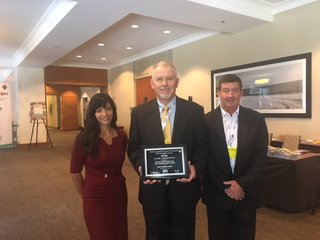The Lane Construction Corp. Wins National Award for Ecological Operations
THE LANE CONSTRUCTION CORP. WINS
NATIONAL AWARD FOR ECOLOGICAL OPERATIONS

Lanham, Md. — The National Asphalt Pavement Association (NAPA) announced today that The Lane Construction Corp., of West Columbia, S.C., is the winner of the 2016 Ecological Award for an existing plant. The award is sponsored by Roads & Bridges magazine. The company was recognized Monday, July 17, at a ceremony honoring the Operational Excellence Award recipients during the NAPA Midyear Meeting in Chicago.
"NAPA members strive for excellence beyond constructing high-quality asphalt pavements. The five categories of the Operational Excellence Awards — Asphalt Operations Safety Innovation, Community Involvement, Ecological, Outstanding Brochure, and Outstanding Website — recognize a company’s commitment to operations that make them good contractors, good industry ambassadors, and good neighbors," said NAPA's Dan Gallagher.
The Ecological Award recognizes asphalt plants whose streamlined production facilities improve productivity and safety. The goal is to demonstrate the asphalt industry’s concern for environmental issues, detail practical methods undertaken to promote environmental stewardship within a company, and emphasize the inherent recyclability of asphalt pavements.
.jpg)
The Lane Construction Corp.'s West Columbia facility is nine years old and operates year-round. The facility consists of a drum mix asphalt plant and a maintenance area. The plant has a capacity of 500 tons-per-hour with three 200-ton storage silos and a Quality Control lab. Operations are year-round.
"Our facility is located on the site of an old mining pit and is prone to erosion," Lane Construction Corp. Plant Manager Lee Barrack said. "We control the erosion by grassing embankments, adding plants, and using swales to limit damage and control the water."
Swales are used to direct water across the site. The pond slopes are grassed, and riprap was added last spring to increase stabilization. The holding pond allows solids time to settle out before water leaves the site. These efforts have helped to minimize on-site erosion and keep turbidity levels low.
Wash water is managed and recycled. There is an equipment wash on-site with a closed-loop system containing an oil-water separator. After the water is separated from the oil, the water is recycled and reused in the equipment wash. The remaining oil is stored in a tank, which is emptied by a recycling company.
In addition to water, Lane uses reclaimed asphalt pavement (RAP); it’s incorporated into all of the mixes. Stockpiles of fine, coarse, and RAP aggregates are stored onsite to supply the plant. The company saves energy by using warm-mix technology in its Open Grade Friction Course interstate paving projects.
The company also has containment areas around the liquid asphalt tanks to protect the site in the event of a tank leak, and protocols are in place to control fugitive dust, exhaust emissions, and noise.
"Lane recognizes that dust, odor and noise generated from operations can be a nuisance. To mitigate these issues, we have Good Neighbor and Preventing Nuisance policies," Barrack said. "Employees are trained on these policies so they can make every effort to reduce any impact on the surrounding community."

The National Asphalt Pavement Association (NAPA) is the only trade association that exclusively represents the interests of the asphalt producer/contractor on the national level with Congress, government agencies, and other national trade and business organizations. NAPA supports an active research program designed to improve the quality of asphalt pavements and paving techniques used in the construction of roads, streets, highways, parking lots, airports, and environmental and recreational facilities. The association provides technical, educational, and marketing materials and information to its members; supplies product information to users and specifiers of paving materials; and conducts training courses. The association, which counts more than 1,100 companies as members, was founded in 1955.



.jpg)
